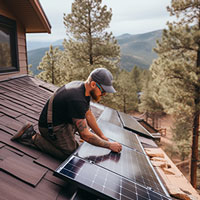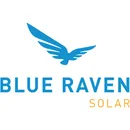Cost of solar panels in Colorado
How much is it to go solar in 2023?

The average cost to install solar panels is $20,176 in Colorado before the federal solar investment tax credit (ITC). The price drops to $14,123 after the ITC.
Going solar in the Centennial State is about 16% cheaper than the national average. The out-of-pocket investment is lower than in other states, in part thanks to more low-cost loan options, tax incentives and rebates.
Key insights
- The average cost per watt is $2.69 in Colorado.
- The average payback period in Colorado is 12 years if you pay for your system in full upfront.
- Colorado residents who go solar save an estimated $14,479 over 25 years.
How much do solar panels cost in Colorado?
Installing residential solar panels can cost between $10,000 to $30,000 or more, though individual costs vary. On average, residents of Colorado pay $20,176 before using the federal tax credit for their systems. Anecdotally, Jennifer in Golden paid $18,000; on the higher end, William in Grand Junction paid more than $20,000 to go solar.
The size of your system plays a big factor in your overall costs. Not surprisingly, the smaller your system, the less you pay. The average size of solar systems in Colorado is 7.5 kilowatts (kW).
Not sure what size system you need? First, find out the amount of electricity you used in the last year in kilowatt-hours (kWh). You’ll find this information through your electric account dashboard online. Then divide your annual kWh by 1,200 to find the system size you need.
For example, the typical Colorado household uses 8,448 kWh per year. Using this formula, the typical household would need a 7-kW system.
» WATT’S THE DIFFERENCE? kW vs. kWh
Average cost by system size in Colorado
| 5 kW | 6 kW | 7 kW | 8 kW | 9 kW | 10 kW | 11 kW | |
|---|---|---|---|---|---|---|---|
| After federal tax credits | $9,415 | $11,298 | $13,181 | $15,064 | $16,947 | $18,830 | $20,713 |
| Before federal tax credits | $13,450 | $16,140 | $18,830 | $21,520 | $24,210 | $26,900 | $29,590 |
| House size | 2,000 square feet | 2,200 square feet | 2,400 square feet | 2,600 square feet | 2,800 square feet | 3,000 square feet | 3,200 square feet |
Are solar panels worth it in Colorado?
Solar panels can be a great investment in Colorado. The state gets plenty of sunshine, especially in places like Pueblo, Denver and Alamosa, and you get increased solar radiation at higher altitudes.
Lots of happy solar customers in Colorado tell us about significant savings on their electric bills. For example, Paul in Colorado Springs said his electric bill is only $14 per month. Bryan in Denver is only paying $4 now.
Colorado receives an average of 5 to 6.5 peak sun hours a day.
It doesn’t work out for everyone, particularly if a lot of your utilities currently run on gas. Charnay in Brighton says it was a mistake going solar because it didn’t help to reduce her gas bill.
“Instead of having a cheaper electric bill, I now have a regular gas bill, United Power bill — not a $20 bill like they tell you,” she said. “It's $106, around that range, and now a Mosaic bill that you purchase your panels through.”
If your house is a good candidate for solar panels, making the switch now is a smart way to protect yourself against rising energy costs in the future.
» STILL NOT SURE? Solar energy pros and cons
Cost factors of going solar in Colorado
Going solar is an investment, and, like with any investment, it's important to know what you're getting into. From the equipment to the roof over your head, many factors affect how much you end up paying.
Solar equipment costs
Solar panels aren't the only thing you're buying. You'll also need inverters, mounting hardware and potentially a solar battery if you're thinking of storing extra energy. All these pieces add up, so make sure you're considering the whole package when you're budgeting. Here are a few common equipment costs:
| Solar equipment | Cost |
|---|---|
| Solar battery | $7,000 to $18,000 |
| Solar inverter | $1,000 to $3,000 |
| Monitoring system | $80 to $400 |
Solar panel efficiency
Some solar panels are more efficient at converting sunlight into electricity than others. This is called solar panel efficiency. Panels with higher efficiency ratings cost more, but you could save money in the long run. It's worth weighing the upfront cost against the long-term savings.
» COMPARE: Most efficient solar panels
Size of your system
Speaking of the number of panels, the size of your system is a big deal. The larger the system, the more it'll cost. But size isn't just about the number of panels: It's also about their weight. Your roof has to be able to handle that load, which brings us to our next point.
» POTENTIAL ENERGY PRODUCTION: How many kWh does a solar panel produce?
Condition of your roof
Quality solar panels can last up to 30 years, so your roof better be up for the long haul, too. If it's not, you'll end up paying extra to remove the panels, fix or replace the roof and reinstall the panels. It's a headache you don't want, so get a roof inspection to make sure it’s ready for your system.
» SHOULD YOU? Replace your roof before going solar
How you pay
Purchasing your solar panels upfront is ideal, but not everyone has the money to do that. The good news is you can finance your solar power system. Just keep in mind that solar loans come with interest charges that increase the overall cost.
Leasing or entering a power purchase agreement (PPA) are options to get the system installed for little or no down payment, but you won't own the panels and won’t qualify for the federal solar investment tax credit.
If you are considering a solar loan, lease or PPA, always ask:
- Is there a down payment?
- How much will I pay per month?
- Will monthly payments increase, and by how much?
» SOLAR PANELS: Lease vs. buy
Local permits and fees
Don't forget the paperwork. Most places require permits to install solar panels, and those aren't free. You might also face some other local fees, so make sure you're factoring those into your budget.
Other cost factors
Solar panels are pretty low-maintenance, but that doesn't mean they're no-maintenance. You might need to shell out for repairs, replacements or just a good cleaning.
Solar incentives, tax credits and rebates in Colorado
The average ITC value in Colorado is $6,053 in 2023.
The federal solar investment tax credit (ITC) is the biggest factor in reducing the cost of going solar in Colorado. If you install a residential solar panel system by the end of 2032, you can deduct 30% of the system's total cost — including equipment, labor and permits — from your federal taxes. The credit drops to 26% in 2033 and 22% in 2034.
Colorado also offers tax incentives, rebates and affordable solar loan programs to make going solar easier. For example, residents installing solar are exempt from state sales and property taxes. Many incentives are also offered through your local power companies.
» EXPLORE: Colorado solar incentives
Compare solar installation companies in Colorado
Compare popular solar companies available in Colorado below. Read our guide to finding the best solar companies for more information.
 |  |  | ||
|---|---|---|---|---|
| Rating | 4.3 | 4.1 | 4.7 | 4.7 |
| # of reviews | 2,189 | 2,685 | 98 | 103 |
| Free consultation | ||||
| Payment options | Cash, loan, lease | Cash, loan, lease | Cash, loan | Cash, loan |
| Warranty | 10 to 25 years | 25 years | 25-year manufacturer warranty, plus a 10-year workmanship warranty | Varies |
| READ REVIEWS | READ REVIEWS | READ REVIEWS | READ REVIEWS |
FAQ
How are solar costs trending in Colorado?
The cost to go solar in Colorado has fallen 43% over the last 10 years, according to the Solar Energy Industries Association.
Can I get free solar panels in Colorado?
There are currently no programs for free solar panels in Colorado. You can lease or enter a PPA with little to no upfront costs. Still, neither is totally free. Solar leases generally require a flat monthly fee; PPAs make you pay per unit of electricity.
» FREE SOLAR PANELS: Are they really free?
How much can I save with solar panels?
When you pay cash, the average 25-year savings with solar is $14,479 in Colorado. It’s a common misconception that solar panels always completely eliminate your monthly power bill. The good news is people who still have a power bill after going solar are paying significantly less than they were before. You can expect to offset your electricity bill by 81% to 110%, according to EnergySage.
How does net metering work in Colorado?
Net metering is basically a way to make some extra cash or get some bill credits when your solar system is pumping out more energy than you can use.
In Colorado, any extra electricity you generate gets turned into bill credits. So, for every extra kilowatt-hour (kWh) you produce, you get a credit that cancels out a kWh on a future bill. And credits you're not using? At the end of the year, you can donate them to help low-income homes pay their energy bills, or you can cash them in.
» COMPARE: Best solar monitoring systems
How many solar panels do I need for my house?
The number of solar panels you need depends on how much electricity your household uses. In Colorado, the average monthly energy consumption is 704 kWh. The average 2,000-square-foot home requires about 19 solar panels.
Will hail damage my solar panels?
Hail can damage solar panels, but you shouldn’t let that deter you from installing them. The cost of fixing any damage that does occur may be covered by your homeowners insurance. Plus, most solar panels are made tough and can handle smaller hail without getting damaged.
Bottom line
Colorado is ranked as one of the top 25 most green states. This is partially due to the great solar incentives the state offers and the low cost of solar for residents. Overall, Coloradans will pay around $14,123 after the ITC and can save around $14,479 over the next 25 years on a new solar system.
Solar costs: Colorado vs. nearby states
| Upfront cost* | ITC value (30%) | Typical system size | Average cost per watt | Payback period** | Estimated net savings | |
|---|---|---|---|---|---|---|
| Colorado | $20,176 | $6,053 | 7.5 kW | $2.69 | 12 years | $14,479 |
| Utah | $21,440 | $6,432 | 8 kW | $2.68 | 14 years | $10,202 |
| New Mexico | $18,760 | $5,628 | 7 kW | $2.68 | 12 years | $15,413 |
| Texas | $30,934 | $9,280 | 8.5 kW | $2.69 | 13 years | $21,350 |
| Kansas | $23,310 | $6,993 | 9 kW | $2.59 | 11 years | $21,455 |
| Nebraska | $29,716 | $8,915 | 10.5 kW | $2.83 | 14 years | $13,421 |
| Wyoming | $23,130 | $6,939 | 9 kW | $2.57 | 13 years | $14,959 |
| Arizona | $30,015 | $9,004 | 11.5 kW | $2.61 | 12 years | $23,891 |
Article sources
- EcoWatch, “ How Much Do Solar Panels Cost in Colorado? ” Accessed Oct. 9, 2023.
- EnergySage, “ Colorado solar panels: local pricing and installation data .” Accessed Oct. 9, 2023.
- Office of Energy Efficiency & Renewable Energy, “ Homeowner’s Guide to the Federal Tax Credit for Solar Photovoltaics .” Accessed Oct. 9, 2023.
- Solar Energy Industries Association, “ Colorado Solar .” Accessed Oct. 9, 2023.
- DSIRE, “ Colorado Solar Programs .” Accessed Oct. 9, 2023.
- The Denver Post, “ McMillin: Colorado’s future is solar (just maybe not on every rooftop) .” Accessed Oct. 9, 2023.
You’re signed up
We’ll start sending you the news you need delivered straight to you. We value your privacy. Unsubscribe easily.
